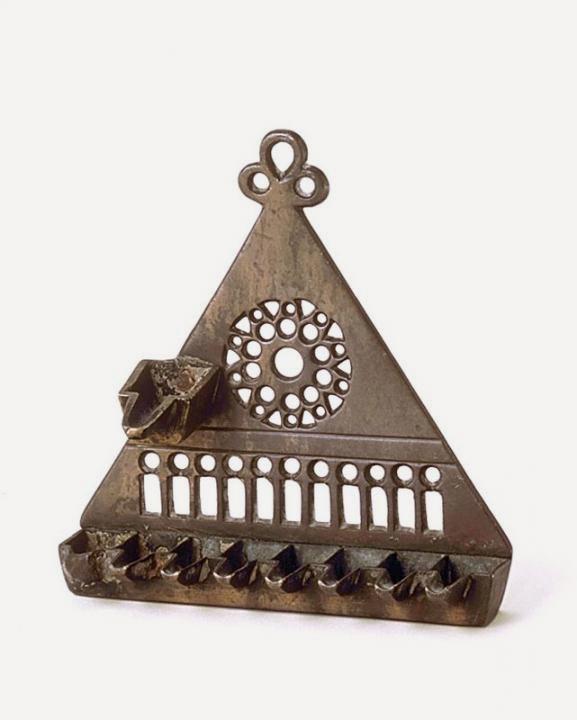
Lampe de la Reconsécration, France, XIVe siècle
France, before 1394
Cast cuprous alloy, 14.5 x 18.2 x 4.8 cm
On permanent loan from the Musée de Cluny ‒ Musée national du Moyen Âge, Paris, Rothschild donation, Strauss collection

Lampe de la Reconsécration, France, XIVe siècle
This type of oil lamp was used to celebrate the Festival of Lights (Hanukkah), commemorating the miracle that took place during the rededication of the Temple in Jerusalem at the time of the Maccabean revolt (167-165 BC), after its pillage by Antiochus IV Epiphanes. Formerly in the collection of the composer and orchestra conductor Isaac Strauss (1866-1888), it was donated after his death to the Musée de Cluny by Baroness Charlotte de Rothschild. It is believed to have been discovered during excavations in the former Jewish quarter in Lyon in the 19th century, this community having been definitively banished from the city in 1394. It is one of the most ancient medieval domestic religious objects known in France.
Intended to be placed on a windowsill in order to publicly announce the miracle of Hanukkah or, as here, to be hung on a wall, its eight lamps are lit successively on each of the eight days of the festival using the ninth lamp, called the shamash (“helper” or “servant”). Its openwork, architecturally inspired decoration, with a rose window in the middle and an arcade below, is of a type frequently found on medieval objects. Its stylisation seems to be more Romanesque than Gothic but does not necessarily refer to the contemporary architecture in the place where it was made, evoking rather the object’s use and link with the history of the Temple in Jerusalem.
This lamp, very probably made for a Jewish client by a Christian craftsman, is very similar to three others in the Israel Museum and private collections.
Michel Nedjar (born 1947, Soisy-sous-Montmorency)
Paris, 2005
Diadem (taj), ear ornaments (khoras amara), bird medallion (serdokh), fibulas (tizerzaï)
Fez, Tangiers, Tétouan, late 18th – early 19th century
Late 18th-early 19th century